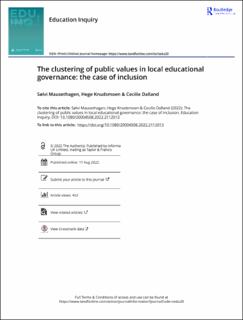The clustering of public values in local educational governance: the case of inclusion
Peer reviewed, Journal article
Published version

Permanent lenke
https://hdl.handle.net/11250/3071983Utgivelsesdato
2022Metadata
Vis full innførselSamlinger
Sammendrag
In this article, we explore and discuss how the clustering of values in local educational governance manifests in the case of inclusion. Public values and the role that these play as mediating factors are important in local governance processes; however, they are often overlooked in empirical studies. Inclusion is interesting because it is currently one of the most dominant political aims in education. Based on extensive data from interviews with municipal administrators in Norway, the following three aspects were important in their meaning-making around inclusive education: (1) an assumed common understanding of inclusion, (2) a general approach to adaptation and (3) a broad view on school development. These largely reflected public values, such as equality and participation, rule of law and accountability, professional autonomy and innovation. However, because the values are clustered in particular ways, inclusion largely becomes a practical and didactic issue. This is important to discuss as the municipal level arguably needs to be involved in analytical discussions to enhance inclusive education. Professional autonomy and accountability are both emphasised and may create value conflicts. How public sector values are mediated and clustered with each other should be discussed, as how this is done give directions for educational practices.
